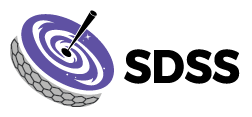SDSS Imaging
From 1998 to 2009, the SDSS imaging survey conducted a wide-field imaging survey. The final version of the imaging data was released in DR13, which contained improved astrometric and photometric calibrations of the complete imaging data set released in DR8. Since that time, SDSS has been focused almost exclusively on spectroscopy, and the modern web access tools have focused on serving that spectroscopy. All of the images and catalogs remain available on the SAS, and all of the catalogs remain available on CAS.
Deprecated Web App Functionality
Specifically, a web app (called “dr10webapp”) provided the following functionality which is now deprecated as of August 2024:
- Determine whether SDSS imaging covers a specific RA/Dec coordinate: https://dr17.sdss.org/imaging/coverage
- Find fields overlapping RA/Dec coordinates: https://dr17.sdss.org/imaging/field/search
- Production of scripts to create mosaics: https://dr17.sdss.org/imaging/mosaics
The software for the original “dr10webapp” is in GitHub and available to the public.
Replacing Web App Functionality
There are ways to reproduce the previous functionality using CAS and external resources, as follows:
- To determine whether SDSS imaging covers a specific RA/Dec
On SkyServer‘s SQL search page or on CasJobs one can check the imaging footprint with thefInFootprintEqfunction, which returns True or False values based on an RA, Dec, radius criterion:SELECT dbo.fInFootprintEq(180., 0., 0.001)
This function can accept multiple RA and Dec values, as described in the Sample Query page under the “Checking if objects are in SDSS footprint” query.
- To find the primary (i.e. highest quality) field covering a specific RA/Dec
The following query returns therun,camcol, andfieldof the best field covering a specific RA and Dec.SELECT DISTINCT f.run, f.camcol, f.field
FROM dbo.fPolygonsContainingPointEq(180., 0., 0.01)
JOIN Region r ON r.regionid=p.regionid
JOIN sdssPolygons s ON r.id=s.sdssPolygonID
JOIN Field f ON f.fieldid=s.primaryFieldID
- To produce mosaics from SDSS imaging
This process was quite involved even with the dr10webapp, which returned a script to download FITS files and to run Swarp on them.
In principle, by using lists of fields covering a specific location (see above), users can download the individual frames and use Swarp. See the full imaging documentation before proceeding!
Another tool to consider is Montage, whose team has published Jupyter notebooks for mosaicing many different survey images, including SDSS.
